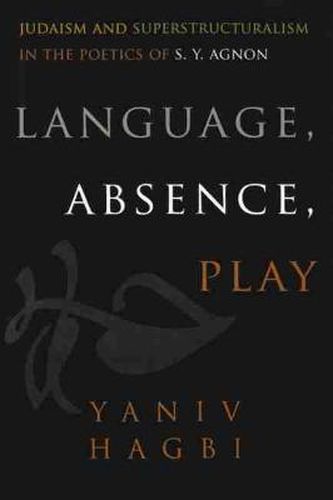Readings Newsletter
Become a Readings Member to make your shopping experience even easier.
Sign in or sign up for free!
You’re not far away from qualifying for FREE standard shipping within Australia
You’ve qualified for FREE standard shipping within Australia
The cart is loading…






Nobel Prize - winning author S. Y. Agnon was the foremost Hebrew writer of the twentieth century. His work navigated the world of Jewish tradition and that of secular modernity, capturing the conflict between old and new. In
Language, Absence, Play , Yaniv Hagbi explores Agnon’s theological and philosophical attitudes toward language, attitudes that to a large extent shaped his poetics and aesthetic values. Drawing on anthologies compiled by Agnon, among others, Hagbi examines his theoretical orientation and the ways he integrated into his poetics ideas about language that are rooted in Jewish theology. In doing so, Hagbi casts light on profound parallels between religiously inspired Jewish hermeneutics and the language-centered superstructuralist theories that have dominated academic discourse in the humanities since the mid-twentieth century. With deep insight and lucid prose,
Language, Absence, Play
demonstrates how the traditional and the contemporary forces shaping Agnon’s literary art inform and transform each other.
$9.00 standard shipping within Australia
FREE standard shipping within Australia for orders over $100.00
Express & International shipping calculated at checkout
Nobel Prize - winning author S. Y. Agnon was the foremost Hebrew writer of the twentieth century. His work navigated the world of Jewish tradition and that of secular modernity, capturing the conflict between old and new. In
Language, Absence, Play , Yaniv Hagbi explores Agnon’s theological and philosophical attitudes toward language, attitudes that to a large extent shaped his poetics and aesthetic values. Drawing on anthologies compiled by Agnon, among others, Hagbi examines his theoretical orientation and the ways he integrated into his poetics ideas about language that are rooted in Jewish theology. In doing so, Hagbi casts light on profound parallels between religiously inspired Jewish hermeneutics and the language-centered superstructuralist theories that have dominated academic discourse in the humanities since the mid-twentieth century. With deep insight and lucid prose,
Language, Absence, Play
demonstrates how the traditional and the contemporary forces shaping Agnon’s literary art inform and transform each other.